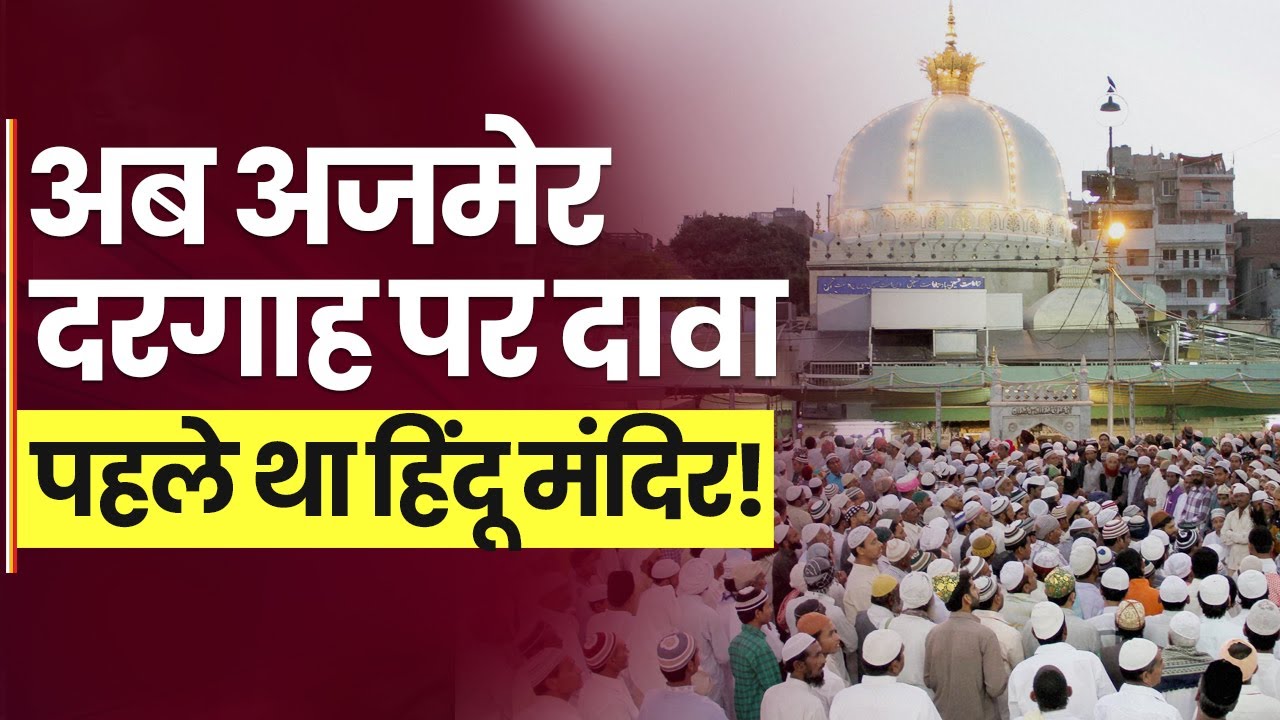


Hindu Sena Chief Vishnu Gupta made claims that the Ajmer Sharif Dargah is actually a Shiva temple and not a Sufi shrine. The local court in Ajmer issued notices to the concerned parties after Gupta filed a petition seeking a survey of the shrine. He cited the writings of author Har Bilas Sarda, who claimed that a Hindu temple existed below the dargah, and called for a truth to be revealed through a survey. The Hindu outfit wants the dargah to be declared a Hindu temple and for permission to pray there, stirring up controversy ahead of the upcoming 813th Urs celebrations.
Ajmer Dargah Controversy: Claims of Hindu Temple Stirs Debate
Background
The Ajmer Dargah Sharif, a revered Sufi shrine in Rajasthan, has become the center of a legal battle following claims that it is a Hindu temple. The controversy erupted after Vishnu Gupta, the chief of the Hindu Sena, filed a petition in an Ajmer court seeking a survey of the shrine. Gupta alleges that a Hindu temple exists beneath the dargah and demands that it be declared as such.
Gupta's petition cites the writings of Har Bilas Sarda, a historian who claimed that a Hindu temple dedicated to Lord Vishnu stood on the site before the construction of the dargah. Sarda's theory is based on the discovery of Sanskrit inscriptions and other artifacts suggesting a Hindu presence in the area.
Hindu Sena's Claims
The Hindu Sena claims that the dargah was built over the ruins of a Hindu temple and that the Sufi saint Khwaja Moinuddin Chishti, who is revered at the shrine, was actually a Hindu ascetic. They argue that the dargah should be returned to the Hindu community and that Hindus should be allowed to pray there.
Local Court's Response
The local court in Ajmer has issued notices to the concerned parties and has scheduled a hearing for April 18, 2023, to consider the petition. The Dargah Committee has denied the Hindu Sena's claims and has vowed to defend the sanctity of the shrine.
Controversy Surrounding Urs Celebrations
The claims by the Hindu Sena have stirred up controversy ahead of the upcoming 813th Urs celebrations, an annual festival that attracts millions of devotees to the dargah. The Hindu outfit's demand for permission to pray at the shrine has raised concerns among the Muslim community.
FAQs
1. What is the basis for the claim that the Ajmer Dargah is a Hindu temple?
The claim is based on the writings of historian Har Bilas Sarda, who suggests that a Hindu temple existed on the site before the construction of the dargah.
2. What evidence supports the Hindu Sena's claims?
The Hindu Sena cites Sanskrit inscriptions and other artifacts as evidence of a Hindu presence at the site.
3. How has the Dargah Committee responded to the claims?
The Dargah Committee has denied the claims and has vowed to defend the sanctity of the shrine.
4. What is the significance of the upcoming Urs celebrations in this controversy?
The Hindu Sena's claims have stirred up controversy ahead of the upcoming Urs celebrations, which attract millions of devotees to the dargah.
5. What is the likely outcome of the court case?
The outcome of the court case is uncertain. However, it is likely to have a significant impact on the ongoing debate over the religious identity of the Ajmer Dargah.

The Pasighat police in East Siang district, Arunachal Pradesh have arrested the 33-year-old boys' hostel warden of Sanggo English School for sexually assaulting minor students. This came to light when a student was hospitalized for urogenital complications. The incident has sparked outrage from parents and the public, demanding strict action against the accused warden. In response, the Arunachal Pradesh State Human Rights Commission (APSHRC) has taken suo motu cognisance and ordered for a detailed report on the investigation, victim protection, and school management.

Actress Siddiqa Begum, daughter and legal heir of Shah Bano, has served a legal notice on the makers of the upcoming Bollywood film 'Haq'. The notice states that the film's unauthorized depiction of the personal life of Shah Bano without the consent of her legal heirs is a violation of their rights. 'Haq' is based on the landmark 1985 Supreme Court case that granted maintenance to Shah Bano, a Muslim woman, from her divorced husband.

After four years, the 'Darbar Move' tradition in Jammu and Kashmir has been restored, fulfilling the promise of the government and bringing a boost to the economy. National Conference chief Farooq Abdullah expressed happiness, noting that those who sought to separate Jammu and Srinagar have failed. Chief Minister Omar Abdullah received a warm reception and inspected the secretariat premises after the ceremony, as security in the region was heightened for the occasion.

Delhi Legislative Assembly Speaker Vijender Gupta praised Swami Dayanand Saraswati as not just a saint and reformer, but also a pivotal figure in India's freedom struggle. Speaking at the International Arya Samaj Conference, Gupta highlighted how Swami Dayanand's teachings sparked a revolution that led to the nation's independence. The event was attended by esteemed guests including Gujarat Governor Acharya Devvrat and top officials from the Arya Samaj community, all paying tribute to the enduring impact and legacy of Swami Dayanand Saraswati.

The Metro Railway Kolkata has announced a major schedule expansion for its Yellow Line, which runs between Noapara and Jai Hind Bimanbandar (Airport) in Kolkata. Starting from 3 November, weekday operations will increase to 120 services with extended operating hours, providing greater convenience and accessibility to commuters. Weekend travellers will also see a significant frequency upgrade, making travel on Saturdays and Sundays hassle-free. This move is expected to improve the overall public transportation system in the city and benefit the commuters.

Despite some reassurances that online verticals focused on diversity will continue, NBC News has announced a round of layoffs that will impact about 150 employees, or 2% of their workforce. The cuts are said to be a result of cost-cutting measures in preparation for the split of Comcast's cable networks into Versant. This move signifies a shift in priorities for NBC management, prioritizing corporate profits over hard-working members, according to Susan DeCarava, president of The NewsGuild of New York. This change also means that MSNBC will no longer lean on NBC News for newsgathering, with those ties expected to be severed next week.

The Kasibugga Venkateswara Temple in Srikakulam district was the site of a heart-wrenching stampede, causing multiple fatalities and affecting the community deeply. Chief Minister N. Chandrababu Naidu has expressed his sorrow over the unfortunate incident, as well as directing officials to ensure that those injured receive the best medical treatment possible. As local officials and public representatives are called to oversee relief operations, swift action is required to aid those affected and manage the situation effectively.

Indian Prime Minister Narendra Modi inaugurated the Shanti Shikhar Academy for Peaceful World in Raipur, praising the Brahma Kumaris organization for bridging India's ancient wisdom with the world's search for harmony. He credited the group's selfless service and spiritual discipline for their efforts towards universal peace. He positioned the Brahma Kumaris as protectors of India's soul and highlighted India's proactive role in addressing global crises such as disaster relief and environmental threats.

In an act of solidarity and protest, millions of Muslims in India used their Friday prayers to denounce the recent killings that took place in Pahalgam. The news comes amid growing tensions between the Muslim community and the Indian government. Many are viewing this as a sign of unity and determination from the Muslim population in India.

The state of Karnataka, or Kannada Rajyotsava, marked its 69th anniversary with a grand ceremony organized by the district administration in Mangaluru. District in-charge minister Dinesh Gundu Rao paid tribute to the leaders and writers who fought for a unified Kannada state and presented awards to 80 outstanding individuals and organizations. In his address, the minister highlighted the rich cultural and historical heritage of Karnataka and called for a sense of pride among its citizens.